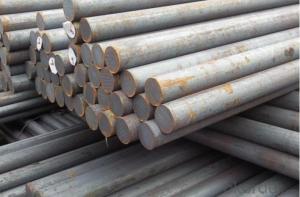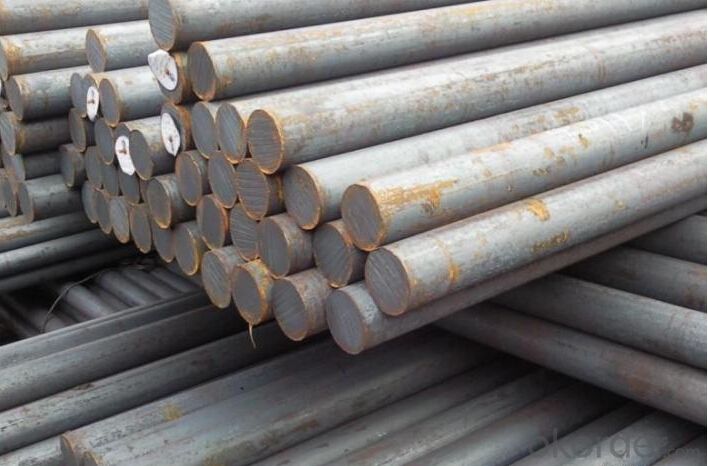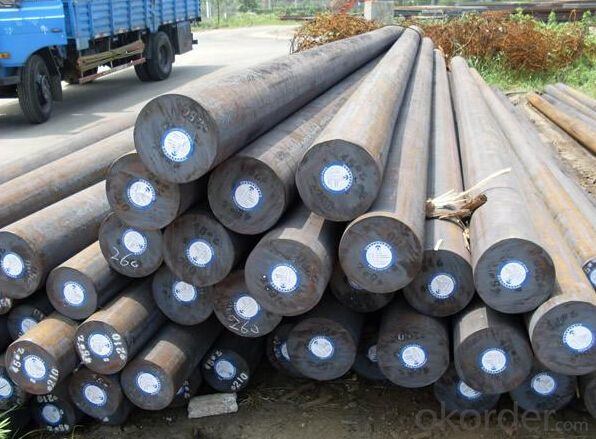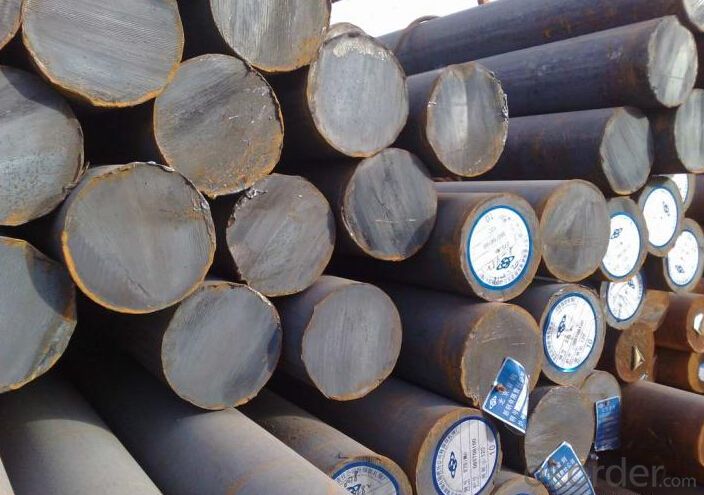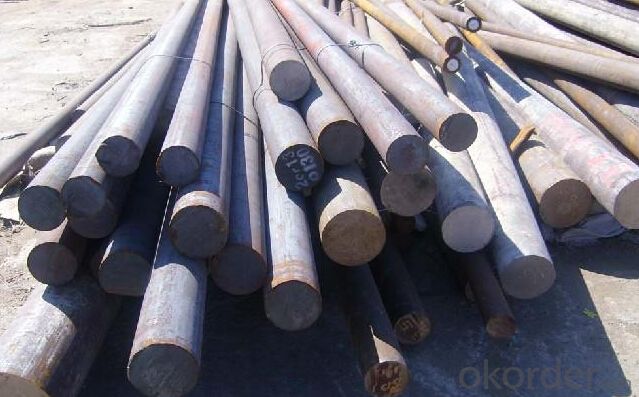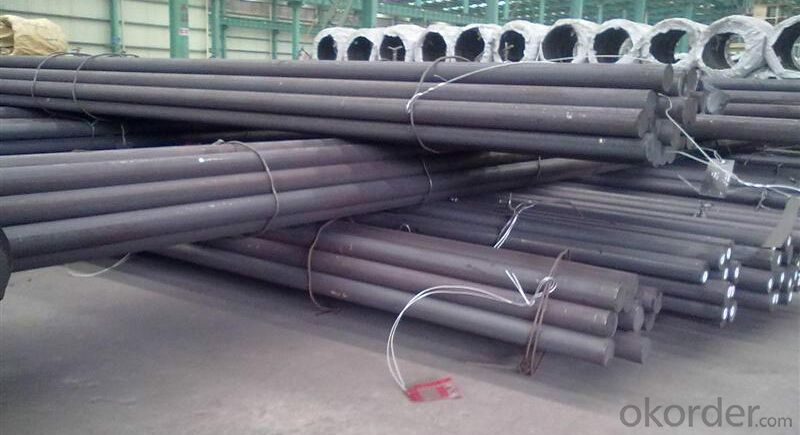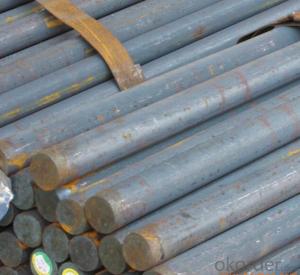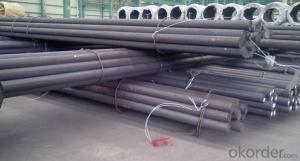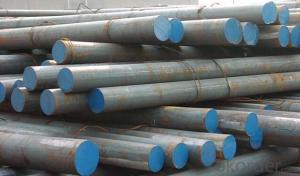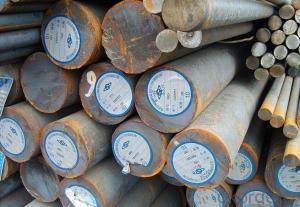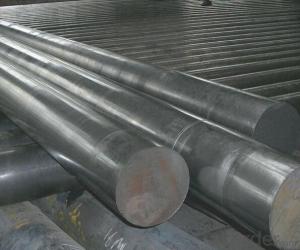Grade SAE A36 CNBM Carbon Steel Round Bar with High Quality
- Loading Port:
- Shanghai
- Payment Terms:
- TT or LC
- Min Order Qty:
- 3 m.t.
- Supply Capability:
- 10000 m.t./month
OKorder Service Pledge
OKorder Financial Service
You Might Also Like
Specification
Product Description
1. Diameter: 8mm-250mm rou
2. Length: 2m, 3m, 5.8m, 6m or customized
3. Standard: GB, ASTM, AISI, SAE, DIN, JIS, EN
4. Produce Process: smelt iron - EAF smelt billet - ESR smelt billet -hot rolled or forged -steel round bar and plate
5. Heat Treatment: annealing, normalizing, tempering, quenching
6. Surface Treatment: Black, Polished, Galvanized
7. Quality Assurance: We accept third party inspection for all orders.
You can ask testing organizations such as SGS, BV, etc. to test our products before shipping.
Chemical Composition
C | Si | Mn | P | S | S |
0.14~0.22% | ≤0.30 | 0.30~0.65 | ≤0.045 | ≤0.050 | ≤0.050 |
Application:
Mold bottom,
Plastic mold
Construction machinery parts
Automobile parts, Security grills, Screens, Construction
Company Information:
CNBM International Corporation is the most important trading platform of CNBM group.
Whith its advantages, CNBM International are mainly concentrate on Cement, Glass, Iron and Steel, Ceramics industries and devotes herself for supplying high qulity series of refractories as well as technical consultancies and logistics solutions.
Packing & Delivery
1. Packaging: seaworthy package or as required
2. Delivery: 35-45 days or based on quantity
Products Show
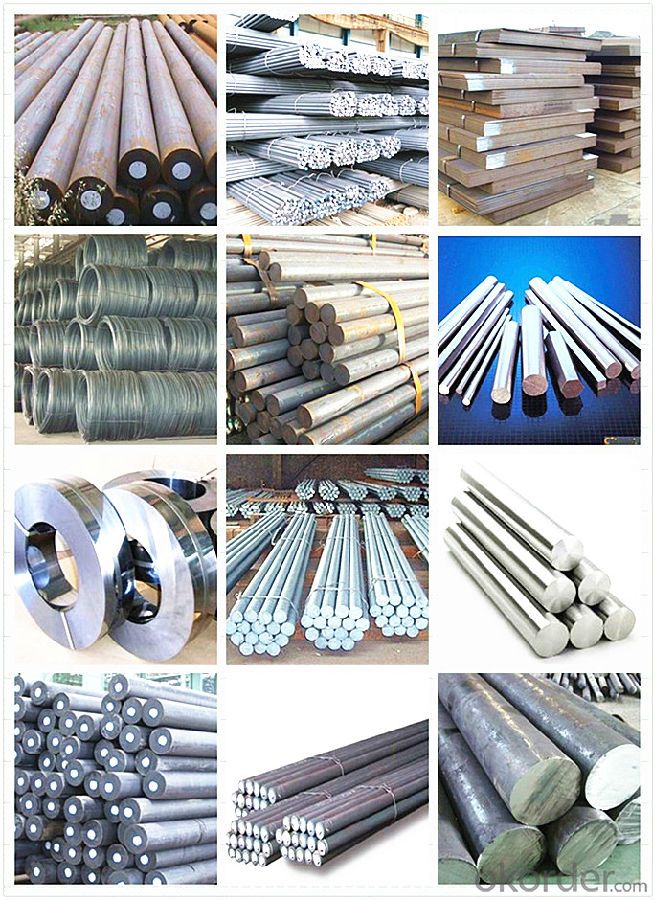
FAQ:
1.Your advantages?
Professional products inquiry, products knowledge train (for agents), smooth goods delivery, excellent
customer solution proposale
2. Test & Certificate?
SGS test is available, customer inspection before shipping is welcome, third party inspection is no problem
3. Factory or Trading Company?
CNBM is a trading company but we have so many protocol factories and CNBM works as a trading department
of these factories. Also CNBM is the holding company of many factories.
4. Payment Terms?
30% TT as deposit and 70% before delivery.
Irrevocable L/C at sight.
5. Trading Terms?
EXW, FOB, CIF, FFR, CNF
6. After-sale Service?
CNBM provides the services and support you need for every step of our cooperation. We're the business
partner you can trust.
For any problem, please kindly contact us at any your convenient time.
We'll reply you in our first priority within 24 hours.
- Q: What are the different processes involved in making special steel?
- The different processes involved in making special steel include melting the raw materials in a furnace, refining the molten steel to remove impurities, adding alloying elements to achieve desired properties, casting or forming the steel into desired shapes, heat treating to enhance its strength and hardness, and finally finishing processes like machining or polishing to achieve the desired surface finish.
- Q: What are the main factors affecting the cost of special steel?
- The main factors affecting the cost of special steel include the cost of raw materials, such as iron ore and alloying elements, production and manufacturing costs, market demand and competition, transportation and logistics expenses, and global economic factors such as currency exchange rates and trade policies. Additionally, the complexity and uniqueness of the steel's composition and processing requirements can also impact its cost.
- Q: How does tool and die steel maintain its hardness and wear resistance?
- Tool and die steel maintains its hardness and wear resistance through a combination of factors such as its chemical composition, heat treatment, and surface treatments. The steel is typically alloyed with elements like chromium, vanadium, and tungsten, which enhance its hardness and wear resistance properties. Additionally, through heat treatment processes like quenching and tempering, the steel is subjected to controlled heating and cooling cycles, which further contribute to its desired hardness and toughness. Surface treatments like nitriding or coating with materials like titanium nitride can also be applied to improve the wear resistance of the steel. Overall, it is the careful selection of steel composition, precise heat treatment, and appropriate surface treatments that enable tool and die steel to maintain its hardness and wear resistance.
- Q: How does special steel contribute to the power generation equipment industry?
- Special steel plays a crucial role in the power generation equipment industry by offering enhanced performance, durability, and reliability. Power generation equipment, such as turbines, generators, and transformers, operate under severe conditions including high temperatures, pressure, and corrosive environments. Special steel, with its unique properties and characteristics, addresses these challenges and contributes significantly to the industry. One of the key advantages of special steel in power generation equipment is its ability to withstand high temperatures. Special steel alloys, such as heat-resistant steels, are designed to perform under extreme conditions, enabling power plants to operate at elevated temperatures without compromising efficiency or safety. These steels maintain their strength, structural integrity, and resistance to creep and fatigue even at the highest operating temperatures, ensuring the reliability and longevity of the equipment. Furthermore, special steel offers excellent corrosion resistance, which is essential in power generation equipment due to the presence of corrosive substances like water, steam, and chemicals. Stainless steel, for instance, is widely used in power plants for its exceptional resistance to corrosion, preventing equipment degradation and minimizing maintenance costs. By using special steel, power generation companies can reduce downtime and enhance overall efficiency. Special steel also contributes to the power generation equipment industry by providing exceptional strength and mechanical properties. This is particularly important for large-scale equipment such as turbines and generators, which are subjected to high mechanical loads. High-strength special steel allows these components to withstand the stress and pressure, ensuring their safe and reliable operation over an extended period. Moreover, special steel's unique properties, such as high hardness and wear resistance, make it suitable for critical components like blades and rotors, reducing the risk of failure and enhancing overall performance. In summary, special steel is an indispensable material in the power generation equipment industry. Its ability to withstand high temperatures, resist corrosion, and provide exceptional strength and mechanical properties ensures the reliability, durability, and efficiency of power plants. By utilizing special steel, power generation companies can enhance their equipment's performance and reduce maintenance costs, ultimately contributing to the sustainable and reliable production of electricity.
- Q: What are the different types of tool steel?
- There are several types of tool steel, including carbon tool steel, alloy tool steel, high-speed tool steel, and hot work tool steel. Each type has its unique composition and characteristics that make it suitable for specific applications in the manufacturing and tooling industry.
- Q: How does special steel contribute to the defense machinery industry?
- Special steel plays a crucial role in the defense machinery industry by offering a range of benefits and contributing to the overall performance and durability of various defense equipment. Firstly, special steel possesses exceptional strength and toughness, making it suitable for manufacturing critical components such as armor plates, ballistic missiles, submarines, and tanks. These components require high resistance to impact, penetration, and extreme conditions, which special steel can provide, ensuring the safety and protection of military personnel and assets. Additionally, special steel offers excellent corrosion resistance, a vital characteristic for defense machinery used in harsh environments such as maritime operations or combat zones. Corrosion can weaken structures and compromise the functionality of equipment, but special steel's resistance helps maintain the integrity and longevity of defense machinery, reducing maintenance costs and increasing operational readiness. Furthermore, special steel enables the production of precision components with high dimensional stability, essential for advanced defense systems like aircraft, missiles, and radars. These components require exceptional accuracy and reliability to function optimally, and special steel's uniformity and consistency meet these demands, ensuring precise performance and enhancing the overall capabilities of defense machinery. Moreover, special steel also contributes to weight reduction in defense machinery. As military equipment becomes more complex and technologically advanced, reducing weight while maintaining strength is crucial for enhancing mobility, fuel efficiency, and overall operational effectiveness. Special steel's high strength-to-weight ratio allows for the development of lighter defense machinery without compromising on durability or protection. In summary, special steel's exceptional strength, corrosion resistance, dimensional stability, and weight reduction properties make it an indispensable material in the defense machinery industry. It enables the production of robust and reliable equipment, ensuring the safety and effectiveness of military operations and enhancing the overall capabilities of defense forces.
- Q: Can special steel be used in the recycling industry?
- Yes, special steel can be used in the recycling industry. Special steel, also known as alloy steel, is often used in the manufacturing of various products, including automobiles, construction materials, and industrial equipment. When these products reach the end of their life cycle, special steel can be recycled and reused in the production of new goods. The recycling industry plays a crucial role in reducing waste and conserving resources, and special steel can contribute to this sustainable practice.
- Q: What are the different methods of joining special steel components?
- There are several methods of joining special steel components, each with its own advantages and applications. Some of the most common methods include welding, brazing, soldering, and mechanical fastening. 1. Welding: Welding is one of the most widely used methods for joining special steel components. It involves melting the base metals and adding a filler material to create a strong bond. Different welding techniques, such as arc welding, gas welding, or laser welding, can be used depending on the specific requirements and properties of the steel components. 2. Brazing: Brazing is a joining process that uses a filler material with a lower melting point than the base metals. The filler material is heated and distributed between the components, creating a strong bond when it solidifies. Brazing is often used for high-temperature applications and can be done with a torch, furnace, or induction heating. 3. Soldering: Soldering is similar to brazing but uses a lower melting point filler material called solder. It is commonly used for electrical and electronic applications, as well as for joining small or delicate steel components. Soldering requires less heat and can be done with a soldering iron or a hot air gun. 4. Mechanical Fastening: Mechanical fastening involves joining components using mechanical means such as screws, bolts, nuts, or rivets. This method is often used when disassembly or reassembly is required, as it allows for easy removal and replacement of components. Mechanical fastening is suitable for applications where a strong and reliable joint is needed but welding or brazing may not be feasible. 5. Adhesive Bonding: Adhesive bonding is another method used for joining special steel components. It involves applying an adhesive material to the mating surfaces and allowing it to cure or harden, creating a strong bond. Adhesive bonding is often used when a continuous joint is required or when joining dissimilar materials. It is also advantageous for applications that require vibration damping or sealing. Each method of joining special steel components has its own strengths and limitations, and the selection of the appropriate method depends on factors such as the specific requirements of the application, the properties of the steel components, and the desired strength and durability of the joint.
- Q: How does special steel perform in mining applications?
- Special steel, known as alloy steel, has unique properties and performance capabilities that make it highly advantageous in mining applications. Its exceptional strength and hardness make it resistant to wear, abrasion, and impact, which is crucial in mining operations where heavy machinery is constantly exposed to harsh materials. This durability reduces the need for frequent repairs and replacements, increasing productivity. Additionally, special steel has excellent corrosion resistance, which is particularly beneficial in mining where equipment is exposed to moisture and chemicals. This resistance ensures the longevity and reliability of mining equipment, reducing maintenance costs and increasing efficiency. Furthermore, special steel offers good heat resistance and high-temperature stability, preventing deformation and structural failure during intense mining operations. This ensures the safety of miners and the overall integrity of mining operations. Moreover, special steel can be customized to meet specific requirements, allowing for the creation of specialized components optimized for mining processes. Whether it's high-strength steel for heavy-duty equipment or corrosion-resistant steel for pipelines, special steel can fulfill the unique demands of mining operations. In conclusion, special steel's exceptional properties make it an ideal material for mining applications, contributing to the efficiency, reliability, and safety of mining operations.
- Q: How does special steel contribute to product innovation?
- Special steel contributes to product innovation in several ways. Firstly, special steel offers enhanced mechanical properties such as high strength, hardness, and wear resistance. This allows designers and engineers to create innovative products that can withstand higher stresses, operate in extreme conditions, and have improved longevity. For example, special steel is commonly used in the aerospace industry to manufacture lightweight yet strong components that increase fuel efficiency and improve overall aircraft performance. Additionally, special steel can be tailored to have specific characteristics such as corrosion resistance, heat resistance, or magnetic properties. This enables the development of innovative products that can operate in challenging environments, such as marine structures, power plants, or electronic devices. For instance, special stainless steel alloys are extensively used in the medical field to produce implants and surgical instruments that are biocompatible, durable, and resistant to harsh sterilization processes. Furthermore, special steel can be manufactured with precise dimensions and tolerances, allowing for intricate and complex designs. This promotes product innovation by enabling the creation of intricate components, such as gears, bearings, or turbine blades, that require high precision and reliability. These advanced designs can improve the efficiency, performance, and overall functionality of various products, ranging from automotive engines to wind turbines. Moreover, the versatility of special steel enables it to be combined with other materials, such as polymers or composites, to create hybrid products with unique properties. This opens up possibilities for innovation in various industries, including automotive, construction, and consumer electronics. For example, special steel-reinforced concrete structures can be more robust and durable, while special steel-reinforced polymers can improve the strength and impact resistance of lightweight components. In conclusion, special steel contributes to product innovation by providing enhanced mechanical properties, tailored characteristics, precise dimensions, and the ability to be combined with other materials. These capabilities empower designers and engineers to create innovative products that have improved performance, durability, and functionality, leading to advancements in various industries.
Send your message to us
Grade SAE A36 CNBM Carbon Steel Round Bar with High Quality
- Loading Port:
- Shanghai
- Payment Terms:
- TT or LC
- Min Order Qty:
- 3 m.t.
- Supply Capability:
- 10000 m.t./month
OKorder Service Pledge
OKorder Financial Service
Similar products
Hot products
Hot Searches
Related keywords
